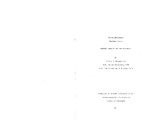| dc.contributor.author | Kargopoulos, Phillipos V. | |
| dc.date.accessioned | 2020-09-03T10:58:21Z | |
| dc.date.available | 2020-09-03T10:58:21Z | |
| dc.date.issued | 1981 | |
| dc.identifier.uri | http://hdl.handle.net/11728/11550 | |
| dc.description.abstract | The central thesis of this dissertation is that the recently
proposed Causal Theories of Reference by K. Donnellan, H. Putnam,
and especially S. Kripke provide support for Scientific Realism
as developed in the theories of J.J.C. Smart, H. Putnam, and especially
R. Boyd, on the face of the most serious challenge to scientific
objectivity contained in the writings of the Relativists
s. Toulmin, N.R. Hanson, T.S. Kuhn, and P. Feyerabend. I have
argued accordingly that all the relativistic arguments are either
weak or are reducible to a strong formal argument about the reference
of scientific terms and the categoricity of scientific systems.
This argument is shown to be even stronger because of the important
role that reference plays in the objectivity of science. I proceed
to show then that the employment of this argument by the Relativists
rests on the Traditional Theory of Reference. In the final part,
I argue that the Traditional Theory of Reference has become untenable,
both on account of internal difficulties and because of advances
in Modal Logic that show some of its basic tenets to be erroneous. | en_UK |
| dc.language.iso | en | en_UK |
| dc.publisher | Boston University Graduate School | en_UK |
| dc.rights | Απαγορεύεται η δημοσίευση ή αναπαραγωγή, ηλεκτρονική ή άλλη χωρίς τη γραπτή συγκατάθεση του δημιουργού και κάτοχου των πνευματικών δικαιωμάτων | en_UK |
| dc.subject | Research Subject Categories::SOCIAL SCIENCES::Social sciences::Psychology | en_UK |
| dc.subject | realism | en_UK |
| dc.subject | ontology | en_UK |
| dc.subject | relativism | en_UK |
| dc.subject | causal theory | en_UK |
| dc.subject | essentialism | en_UK |
| dc.title | Realism, relativism and reference | en_UK |
| dc.type | Thesis | en_UK |

